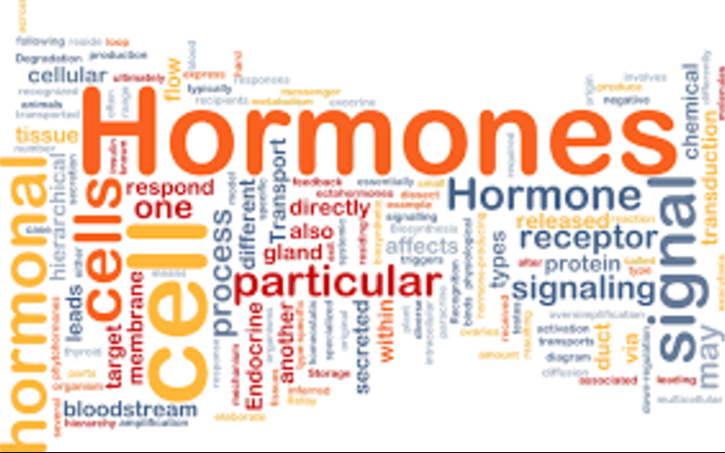What Do Hormones Do? What Are Their Side Effects?
PCOS is partly a hormonal disorder. But what is a "hormone", anyway?
Hormones are essentially chemical messengers that tell your cells what to do. Most hormones are created in various glands and tissues in your body and are carried in your bloodstream. Once a hormone gets into your bloodstream, it will encounter a cell or an enzyme.
Free PCOS Newsletter
Cell Receptors

When a hormone encounters a target cell, a specific interaction occurs. The desired interaction depends on the presence of a receptor site on the cell wall, and a corresponding, unique shape of the hormone.
The interaction is similar to a lock- and-key relationship. If the hormone "key" fits the cell receptor "lock", the hormone delivers its message to the cell and the cell carries out the instruction given to it by the hormone.
However, dietary deficiencies or high demands for nutrients caused by chronic stress can prevent the cell from creating a proper receptor site. The hormone can arrive at the cell, but no receptor doorway appears. Even if you have enough hormones, they may not communicate properly with your cells if you have a poor diet and are under chronic stress.
Some chemical compounds, either natural or synthetic, can fit into a cell receptor designed for a hormone - just like the wrong key can sometimes fit into a lock. When a compound is similar in shape to a certain hormone, it may be able to lock into the cell receptor for that hormone. But since it has a slightly different structure than the hormone, it will deliver a different instruction to your cell and your cell will function in a different way. Or a compound may simply occupy the receptor, thus preventing the ideal hormone from locking into that receptor.
Whether the chemical is good, bad or neutral depends on the specific compound. The problem is that there are tens of thousands of chemical compounds in our foods and water, in our environment, and in pharmaceuticals that may compete for the same cell hormone receptor sites. Each of these may deliver a message to your cells that is different from your own hormone, or they may prevent your hormone from docking into the cell.
Enzymes
Another thing that can happen with a hormone circulating in your bloodstream is that it may encounter an enzyme. There are many hundreds of different enzymes in your body, each having a specialized function. An enzyme is something that causes a chemical reaction to occur.
When an enzyme and hormone meet, another lock-and-key situation occurs. If the hormone-key fits into the enzyme-lock, the enzyme changes (metabolizes) the hormone into something else. The hormone may be changed into a slightly different hormone, or converted into a substance that is to be excreted from the body.
Keep in mind that hormones need to be broken down and excreted. If not, they can build up and eventually cause serious health problems. Enzymatic action is a crucial part of the removal process. Nutritional deficiencies may prevent you from forming the enzymes necessary for properly managing your hormones.
Enzymes and Synthetic Hormones
The enzyme picture is also clouded by the introduction of numerous environmental chemicals and pharmaceuticals into your body.
One example of many is ethinyl estradiol, a synthetic estrogen derivative found in most birth control pills. It is structurally similar to but different from the estrogens you produce inside your body. It is able to compete for estrogen receptor sites on cells in your body and thus exert an estrogen-like effect.
However, your body has never seen ethinyl estradiol before. You were not born with enzymes to optimally metabolize this chemical. When you have a foreign, synthetic chemical floating around in your body, there's a risk it may not be metabolized in an optimal way. The result is that your body becomes hormonally and metabolically unbalanced. You would then probably experience "side effects" or potential long-term adverse health consequences.
Bottom Line: Many pharmaceutical products, including hormone derivatives, offer relief of symptoms, which is an obvious benefit. However, unintended, unforeseen and undesirable long- term metabolic consequences are likely to occur because your body is not optimally equipped to handle these foreign compounds.
Get Answers to your Questions about
- Fertility
- Weight Control
- Hair Loss
- Stress
- Unwanted Hair
- Acne...and more!
FREE PCOS Report
and Newsletter

Your email is safe with us. We respect your privacy, and you may unsubscribe at any time.
Recent Articles
-
PCOS Long Journey to The Happy End
Apr 30, 18 07:24 PM
Hi Girls, Maybe my story will have one day a good end but I am not there yet. Until I was 31 years old I lived my dream, having lovely husband, good -
PCOS and Miscarriage
Apr 17, 18 04:03 PM
Proper diet and natural supplements can help the body maintain a pregnancy through successful delivery.
-
How to Deal with PCOS and Stress
Apr 04, 18 04:19 PM
Your body has a natural capacity to heal itself if you provide it with the necessary tools.





